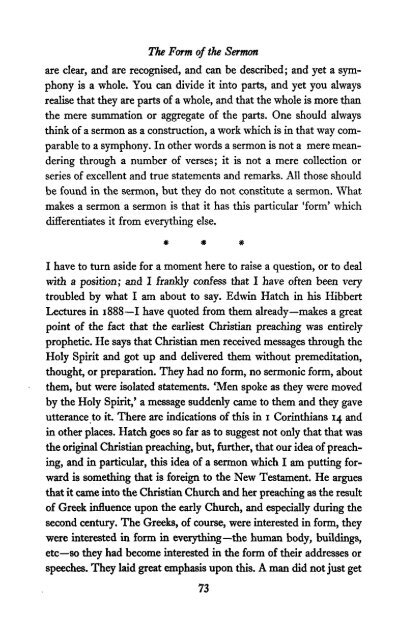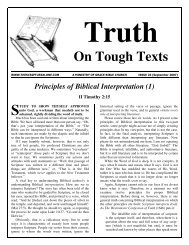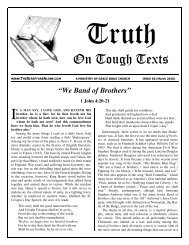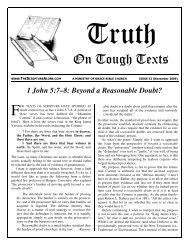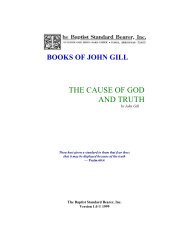- Page 2 and 3:
13th printingPreaching &Preachersby
- Page 5 and 6:
PREACHING AND PREACHERS
- Page 7 and 8:
PREACHING ANDPREACHERSbyD. MARTYN L
- Page 9:
To all the members of the Westminst
- Page 12 and 13:
ForewordIf there ever was a preache
- Page 14 and 15:
PrefaceI should have learned someth
- Page 17:
PREACHING AND PREACHERS
- Page 20 and 21:
Preaching and Preachersneed of prea
- Page 22 and 23:
Preaching and PreachersThis attitud
- Page 25 and 26:
The Primacy of Preachingpulpiteeris
- Page 27 and 28:
The Primacy of PreachingStill worse
- Page 29 and 30:
The Primacy of Preachingare interes
- Page 31 and 32: The Primacy of Preachingthe same in
- Page 33 and 34: ThePn'macy ofPreackt'ngchapter of t
- Page 35 and 36: The Primacy ofPreachinggreat moveme
- Page 37 and 38: No SubstituteWhat is it? Well, nega
- Page 39 and 40: No Substituteassert that it is the
- Page 41 and 42: No Substitutethe symptoms you can c
- Page 43 and 44: No SubstituteThese proposals that w
- Page 45 and 46: No Substitutedisputing or criticisi
- Page 47 and 48: No Substituteargument today as 1 ha
- Page 50 and 51: Preaching andPreachersthem and show
- Page 52 and 53: Preaching and Preachershad come and
- Page 54 and 55: Preaching and PreachersLet me tell
- Page 56 and 57: Preaching and PreachersAs this is g
- Page 58 and 59: Preaching andPreachersdestiny. In o
- Page 60 and 61: Pretuhing andPreacher«essential be
- Page 62 and 63: Preaching andPreacherswill be drive
- Page 64 and 65: Preaching andPreachersI remember a
- Page 66 and 67: Preaching and Preachersthe preacher
- Page 68 and 69: Pretu:hing and Pretu:hersDaniel Row
- Page 70 and 71: Preaching andPreachersman she descr
- Page 72 and 73: Preaching andPreachenthat must be d
- Page 74 and 75: CHAPTER FOURThe Form ofthe SermonWE
- Page 76 and 77: Preaching andPreachersthis up later
- Page 78 and 79: Preaching andPreacherscomment on th
- Page 80 and 81: Preaching andPreachersparticular st
- Page 84 and 85: Preaching and Preachersup and speak
- Page 86 and 87: Preaching and Preachersyou are goin
- Page 88 and 89: Preaching and Preachershave arrived
- Page 90 and 91: Preaching andPreachersand used of G
- Page 92 and 93: Preaching and Preachersmediated thr
- Page 94 and 95: Precu:hing and Preacher«merely in
- Page 96 and 97: Preaching and Preachersbecause I pr
- Page 98 and 99: Preaching and PreachersHe is so mov
- Page 100 and 101: Preaching andPreachersbe moved by i
- Page 102 and 103: Preaching and Preacherspreacher doe
- Page 104 and 105: Preaching and Preachersshows his em
- Page 106 and 107: Preaching andPreachersTo sum it up,
- Page 108 and 109: Preaching and Preachersthing I have
- Page 110 and 111: CHAPTER SIXThe PreacherI WOULD REMI
- Page 112 and 113: Preaching and Preachersconvert some
- Page 114 and 115: Preaching and Preachersfalse view i
- Page 116 and 117: Preaching andPreachersobsession, an
- Page 118 and 119: Preaching and Preachersof the Acts
- Page 120 and 121: Preaching and Preachersknowledge an
- Page 122 and 123: Preaching andPreachersin his whole
- Page 124 and 125: Preaching and Preacherson my advice
- Page 126 and 127: Preaching andPreachersmessage. A ma
- Page 128 and 129: Precuhing and Preachersalmost to th
- Page 130 and 131: Preaching and Preachersthem, negati
- Page 132 and 133:
Preaching and Preachersmay remember
- Page 134 and 135:
Preaching and Preachersthem that th
- Page 136 and 137:
Preaching and Preachersbecause 1 th
- Page 138 and 139:
Preaching and Preacherswere talking
- Page 140 and 141:
Preachz'ng andPreachersthough I mig
- Page 142 and 143:
Preaching andPreachersspeak in the
- Page 144 and 145:
Preaching andPreacherspoint, incide
- Page 146 and 147:
Preaching and PreachersFor though I
- Page 148 and 149:
Preaching andPreachershad to correc
- Page 150 and 151:
Preaching andPreachershistory on th
- Page 152 and 153:
Preaching andPreacherspeople up int
- Page 154 and 155:
Preaching andPreachersan assessment
- Page 156 and 157:
Preaching andPreachersBut I must ad
- Page 158 and 159:
Preaching and Preachersof the churc
- Page 160 and 161:
Preaching and Preachersbenefit from
- Page 162 and 163:
Preaching and Preachers"the Church"
- Page 164 and 165:
Preaching and Preachershappening, y
- Page 166 and 167:
Preaching and Preachersblame will b
- Page 168 and 169:
Preaching and Preachersa Christian,
- Page 170 and 171:
Preaching andPreachersis but one th
- Page 172 and 173:
Preaching and Preachersspent in ord
- Page 174 and 175:
Preaching andPreachersLet me end th
- Page 176 and 177:
Preaching andPreachersdoes, or that
- Page 178 and 179:
Preaching andPreachersillustration
- Page 180 and 181:
Preaching andPreachersthink it is-b
- Page 182 and 183:
Preaching and Preachersof reading t
- Page 184 and 185:
Preaching and Preacherswith regard
- Page 186 and 187:
PretUhing and Preachersin the midst
- Page 188 and 189:
Preaching and Preacherswhere scienc
- Page 190 and 191:
Preaching and Preachersand they cou
- Page 192 and 193:
Preaching and Preachersrelief for t
- Page 194 and 195:
Preaching andPreachersamazing reaso
- Page 196 and 197:
Preaching andPreachersis most impor
- Page 198 and 199:
Preaching and Preachersthe people a
- Page 200 and 201:
Preaching and Preacherswas my own d
- Page 202 and 203:
Preaching and Preachersover-intelle
- Page 204 and 205:
Preaching andPreachersto preach a r
- Page 206 and 207:
Preaching and Preachersput down on
- Page 208 and 209:
Preaching and Preachersone line and
- Page 210 and 211:
Preaching and Preacherscrucifixion
- Page 212 and 213:
Preaching andPreachersin this parti
- Page 214 and 215:
Preaching and Preacherswhen the ver
- Page 216 and 217:
Preaching and Preachersrelevance fo
- Page 218 and 219:
Preaching and Preachersin your mind
- Page 220 and 221:
Preaching and Preachersare beginnin
- Page 222 and 223:
Preaching and Preachersused to enjo
- Page 224 and 225:
Preaching and Preachersknow that th
- Page 226 and 227:
Preaching and Preacherspractice was
- Page 228 and 229:
Preaching and PreachersThe Puritans
- Page 230 and 231:
Preaching and Preachersinterested i
- Page 232 and 233:
Preaching and Preachersit comes to
- Page 234 and 235:
CHAPTER TWELVEIllustrations, Eloque
- Page 236 and 237:
Preaching and Preachersordinary tim
- Page 238 and 239:
Preaching and Preachersthere are ex
- Page 240 and 241:
Preaching and Preacherswell perhaps
- Page 242 and 243:
Preaching and PreachersThat is pros
- Page 244 and 245:
Preaching andPreachersand you shoul
- Page 246 and 247:
Preaching and Preachersme one of th
- Page 248 and 249:
Preaching and Preachersliterally tr
- Page 250 and 251:
Preaching and Preacherswe produce r
- Page 252 and 253:
Preaching andPreacherssermon? First
- Page 254 and 255:
CHAPTER THIRTEENWhat to AvoidWE HAV
- Page 256 and 257:
Preaching andPreachersA still more
- Page 258 and 259:
Preaching and PreachersThis questio
- Page 260 and 261:
Preaching and PreachersAs the vario
- Page 262 and 263:
Preaching and PreachersThey are con
- Page 264 and 265:
Preaching and Preachersanother has
- Page 266 and 267:
Preaching and Preachersfinal undoin
- Page 268 and 269:
Preaching andPreacherspeople listen
- Page 270 and 271:
Preaching and Preachersindividual p
- Page 272 and 273:
Preaching andPreachersa pronounced
- Page 274 and 275:
Preaching and PreachersAbove all; d
- Page 276 and 277:
Preaching and Preacherscentury end
- Page 278 and 279:
Preaching and Preachersadoration an
- Page 280 and 281:
Preaching and Preachersso, they had
- Page 282 and 283:
Preaching and Preachersclearly, thi
- Page 284 and 285:
Preaching and Preacherspeople were
- Page 286 and 287:
Preaching andPreachersthat I would
- Page 288 and 289:
Preaching and Preachersbecause it h
- Page 290 and 291:
Preaching and PreachersFoul, I to t
- Page 292 and 293:
Preaching and Preachersappeal must
- Page 294 and 295:
Preaching and Preachersrepeatedly.
- Page 296 and 297:
Preaching and Preacherspreacher's c
- Page 298 and 299:
Preaching and Preachersto you yours
- Page 300 and 301:
Preaching and Preachersif there is
- Page 302 and 303:
Preaching and Preachersindividualit
- Page 304 and 305:
Preaching and Preachersman, 'Well,
- Page 306 and 307:
Preaching and Preachersthe pulpit t
- Page 308 and 309:
Preaching and Preachersand the peop
- Page 310 and 311:
Preaching and Preachersdevelop and
- Page 312 and 313:
Preaching and PreachersI had never
- Page 314 and 315:
CHAPTER SIXTEEN'Demonstration ofthe
- Page 316 and 317:
Preaching and Preachersshall he tur
- Page 318 and 319:
Preaching and Preachers(hey were al
- Page 320 and 321:
Preaching andPreachers3 and 5: 'Whe
- Page 322 and 323:
Preaching and Preachershe then deli
- Page 324 and 325:
Preaching andPreachersonly, but als
- Page 326 and 327:
Preaching andPreacherswas also a po
- Page 328 and 329:
Preaching andPreathersthem, of the
- Page 330 and 331:
Preaching andPreachersWhitefield te
- Page 332 and 333:
Preaching and Preachersnumber of co
- Page 334 and 335:
Preaching and PreachersThe power ca


